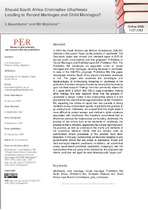Should South Africa Criminalise Ukuthwala Leading to Forced Marriages and Child Marriages?
Abstract
In 2014 the South African Law Reform Commission (SALRC)
released a Discussion Paper on the practice of ukuthwala. The
Discussion paper was revised and released again in 2015 to
include public consultations and the proposed Prohibition of
Forced Marriages and Child Marriages Bill (Prohibition Bill). The
Prohibition Bill introduces an expanded crime of forced
marriages and child marriages, including because of ukuthwala.
In view of the SALRC's proposed Prohibition Bill, this paper
investigates whether South Africa should criminalise ukuthwala
or not. The paper also examines the advantages and
disadvantages of criminalising breaches of ukuthwala in the
protection of women and girls affected by the practice by drawing
upon the field research findings from the community where the
S v Jezile 2015 2 SACR 452 (WCC) case originated. Among
other findings, the field research show that the practice of
ukuthwala is deeply rooted in the communities where it is still
prevalent to the extent that the approach taken by the Prohibition
Bill, expecting the victims to report their own parents or family
members to law enforcement agents, might force the practice to
go underground. Ultimately, we suspect that this might make it
more difficult to protect women and children's rights violations
associated with ukuthwala. We therefore recommend that to
effectively address the malpractices surrounding ukuthwala, the
process of law reform look at the elements of ukuthwala, the
procedure that is followed, appreciate the cultural significance of
the practice, as well as understand the merits and demerits of
the customary delictual claims that are already used by
communities where processes of the practice have been
breached. In this way, communities will be more receptive to any
government's efforts that are aimed at addressing forced and
child marriages linked to ukuthwala. In addition, we submit that
unless government prioritises awareness campaigns into the
communities that are going to be affected by the proposed law
reform, such law, will again be what Himonga calls "paper law".

